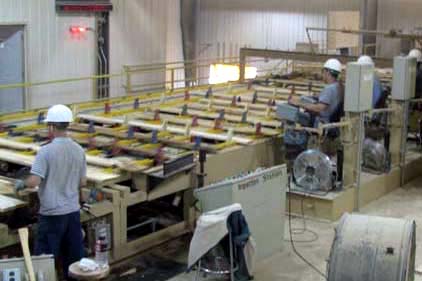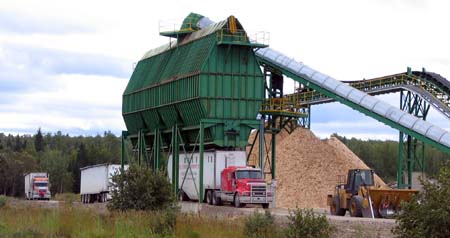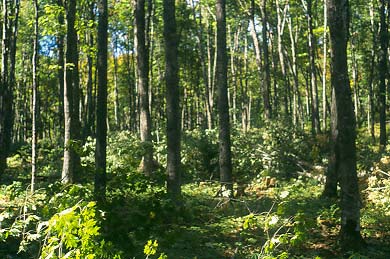For a Maine Family Business – The Jobs Come Next
By: Amos S. Eno
Posted on:08/29/2012 Updated:08/30/2012Pingree forests move from pulpwood to pellets & parquet
This blog continues my discussion with Seven Islands Land Company President John McNulty who manages over 1.2 million acres of forests in Maine based on the environmentally friendly conviction that “A managed forest is a healthy forest.” More information is in my previous blog For a Maine Family Business – “The Forest Comes First.”
The family-owned Seven Islands Land Company is proving that with expert management, forests producing low-value pulpwood instead can produce far higher-value pellets and parquet – and generate jobs. The next step, according to Seven Island President John McNulty, may be expanding into biomass and biomass energy.
 The latest developments for this family-owned Maine forestry company founded in 1841 began in the 1990s when the Seven Islands management team became progressively frustrated by the rapidly growing public perception that all forest management practices were environmentally unsound. The managers knew that their approach to forestry was sound, but had no tangible way to distinguish their practices from others in the eyes of the public. They found a way in 1995 when they learned about the Forest Conservation Program set up by Scientific Certification Systems (SCS).
The latest developments for this family-owned Maine forestry company founded in 1841 began in the 1990s when the Seven Islands management team became progressively frustrated by the rapidly growing public perception that all forest management practices were environmentally unsound. The managers knew that their approach to forestry was sound, but had no tangible way to distinguish their practices from others in the eyes of the public. They found a way in 1995 when they learned about the Forest Conservation Program set up by Scientific Certification Systems (SCS).
After a rigorous evaluation process, SCS certified Seven Islands as a “Well-Managed Forest.” (To see how rigorous the evaluation is, read this 35-page SCS certification report on Seven Islands). Along with maintaining its SCS Forest Stewardship Council (FSC) certification with annual audits, in 1999 Seven Islands earned certification by the Sustainable Forestry Initiative (SFI) of the American Forest and Paper Association, maintaining dual certifications.
Today these certifications plus the conservation easement signed in 2001 to preserve the Pingree family forests as working forests forever have helped create a job-generating success story.
Seven Islands’ latest move was its June 2012 acquisition of the MooseWood hardwood flooring brand produced at Moosewood Millworks LLC, a Maine company offering flooring distributed across the northeastern U.S. With MooseWood employment now at 16 (a jobs number McNulty expects to grow quickly), Seven Islands total employment stands at 120 direct company jobs. That includes employees at the Seven Islands parent company, its Maine Woods Company sawmill, its Portage Wood Products chip plant, and its Orion Timberlands management company. Additionally, Seven Islands contracts out its harvest operations to independent logging companies, accounting for some 350 indirect jobs including harvesting, trucking, roadwork and other services. Adding up all these jobs, with more to come he’s certain, McNulty concludes that “We do have quite an economic impact, especially in northern Maine.”
 McNulty explains that Seven Islands purchased the flooring company, now fully integrated with the company mills, to “add value to the hardwood saw logs from the forest.” Looking ahead, he says “We’re always exploring other opportunities. You can’t manage the forests without markets. How do we create that integration of the market back down to the stump, so we can do the things we want to do and do them well. I think the next new area of exploration will be in the area of biomass, bioenergy. I’m not quite sure yet what form that will take, but I get calls all the time from people wanting to explore some new process or create this chip plant or biomass power or a pellet mill. I think that’s the next opportunity over perhaps the next two to five years.”
McNulty explains that Seven Islands purchased the flooring company, now fully integrated with the company mills, to “add value to the hardwood saw logs from the forest.” Looking ahead, he says “We’re always exploring other opportunities. You can’t manage the forests without markets. How do we create that integration of the market back down to the stump, so we can do the things we want to do and do them well. I think the next new area of exploration will be in the area of biomass, bioenergy. I’m not quite sure yet what form that will take, but I get calls all the time from people wanting to explore some new process or create this chip plant or biomass power or a pellet mill. I think that’s the next opportunity over perhaps the next two to five years.”
Noting that “The mills are new to the mix,” McNulty insists that “Our focus has always been and remains that the forest comes first. We’re never going to do anything to just blindly keep the mills going at the expense of the forest’s long-term health and sustainability.”
McNulty adds one note of caution. He thinks the public pendulum may have swung too far toward restrictions since Seven Islands signed its pioneering conservation easement in 2001. Today, he says, “Negotiations between easement sponsors and landowners have become more and more focused on directed management of the owner’s property. The price paid to owners has gone up, but there tend to be more restrictions in the easement on what they can and can't do in terms of management.”
McNulty says conservation easements funders should recognize the fact that forest owners need “the flexibility to manage their land” – and should recognize that a good conservation easement can generate good jobs. He concludes that “there are opportunities to expand the easement universe if those willing to purchase the easement are willing to negotiate less stringent standards. If purchasers are going to restrict your opportunity by creating conditions that become costly to you, then that has to be reflected in the money coming to you at the time of purchase.” I agree with John. Owners need management flexibility after relinquishing their development rights.
For more on how the Pingree family has turned its forests into a job-generating machine with help from a perpetual conservation easement, see my previous blog For a Maine Family Business – “The Forest Comes First.”
For more information on conservation easements and their tax implications, read my August 21 Deductions on Conservation Easements and August 23 How Estate Taxes and Conservation Easements are Linked blogs. The two blogs quote tax attorney Steve Small, the expert who wrote the original federal tax regulations for conservation easements thirty years ago.
For more information on Pingree family forestry operations, see the forestry-management Seven Islands Land Company, the Maine Woods Company sawmill, the Orion Timberlands company which manages forests for other owners, and MooseWood Millworks which sells Forest Stewardship Council (FSC) certified hardwood flooring.
 Sign In
Sign In
 Sign In
Sign In
